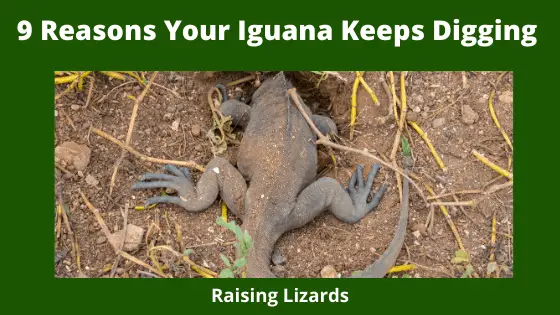Why Iguana Keeps Digging, Iguanas, the herbivorous lizards are native to Mexico, South America, and the Caribbean. These are cold-blooded and like warm temperatures. Iguanas lead active social lives at least during the breeding season. The males advertise the ownership of territory by bobbing their heads and display large dewlap and patrol in the territory.
The other males that try to move to the area are chased away, but up to eight females move to the territory, compete among themselves to access the territory holding male. In the breeding phase, the males divert their energy to change their appearance to chase off the rival males. Jump to 7 Reasons to Have a Pet Iguana
After mating, the males stay closer to the females for post-copulatory guarding, a behavior that prevents the mating of that female with the other male. This is done to prevent sperm competition inside the body of females. Rather than attracting the females, they try to mate with them forcibly.
Why Iguana Keeps Digging / Iguana Digging Behavior:
Green iguanas usually dig holes to lay their eggs but may dig to gain access under a fence or wall too. Green iguana nests usually have a capital “D” (on its side) shaped entry, with a pile of sand outside. They cover their holes when done, and often return to them to lay again. More than one female may lay in the same nesting hole. They can do extensive damage to landscaping.
Digging as Part of Aggression:
Some iguanas will head bob for simple reasons like that many times in one hour or may wag their tails. If iguana has not been working with, it will often stay unwelcoming and aggressive towards others.
Remember, many factors contribute towards the mood and character of iguanas, these include the living conditions and the presence of other pets (or iguanas). The tail-wagging behavior in iguanas is not always due to aggressive behavior. Females will higher aggression levels, will be digging a lot, leaving some poop in various spots to mark the territory, acting somewhat aggressive, and refusing to eat.
Changes in the Environment:
The other reason for the digging behavior in iguanas is when they fail to accept their habitat. An iguana can dig because she does not like her environment. Iguanas are smart lizards and will display lots of different behaviors. In stressful conditions,
Iguanas tend to close their eyes to feel well, stress-free, and comfortable. There are three very common types of iguanas that will dig holes in your yard, the most common iguana is the green iguana followed closely by the Mexican spiny-tailed iguana, and lastly the black spiny-tailed iguana. Your iguana might also put its back leg on the tail.
Digging During the Breeding Period:
If your iguana is digging, then it’s probably gravid (pregnant) or is going through the breeding season. This way, your iguana states that it’s the dominant figure and that it’s not scared of anyone.
When your iguana is head-bobbing, also look at its body movements. If its dewlap (skin under the chin) stays relaxed and the iguana does not get up or try to extend its body, then you have nothing to worry about.
If your iguana is comfortably sitting or lying down, and then you come in, it might head bob at you. Even if your iguana is in a room he will still dig to get out, that is how much they seek and need freedom. With time, you will see that your iguana has its own interesting personality traits.
If your iguana is not in a good mood or feels seriously threatened – it will head bob to show its frustration and readiness to attack. Once you know how to read the signs of an aggressive and mad iguana, you will learn to avoid any risky situations and leave your iguana alone before it attacks. With time, your iguana might start closing only one, which means that it trusts you much more. Digging behavior is linked to the stress condition of iguanas.

Types of Stress:
Basically, there are the three types of stress:
Environmental Stress:
The change in the environment contributes to this type of stress. The changes include the change in light, heat, photoperiod, space, or the other surrounding factors. The changes in the iguana’s physical environment include any changes in their enclosure; or any change in the part of the room which is visible to them from their enclosure, moving his enclosure to a different place or different room as well as moving him to a new enclosure.
Behavioral Stress:
This type of stress is linked to changes in the behavior and lifestyle of iguanas. The alteration in the daily routine leads to unhealthy behavioral changes.
Social Stresses:
This type of stress is related to the social behavior of iguanas. This includes different interactions with the human as well as with other pet iguanas or any other animal.
The stress causes the following changes in behaviors that includes:
Appetite:
When an iguana is facing stress, its appetite changes, and an increase or decrease is observed which varies from individual to individual. In some iguanas, the loss of appetite is observed while others may start stress-eating.
Attitude:
Stress causes different changes in behaviors, iguanas going through stress display signs of aggression, may become lethargic, cranky or clingy, and sometimes mopey which is not related to the normal shedding behavior.
Changes in Daily Activities:
The stress also causes the change in the daily routine of iguanas, stressed iguanas might display altered basking behavior, abnormal sleeping pattern, soaking and lounging behavior might change and they may start choosing cold places to stay while in actuality they are warmth-loving lizards.
Changes in your routine also trigger stress in iguanas, these changes include changing the timing of when you do things; changing your daily schedule, such as being away from home for prolonged periods when you are normally at home during the day; significant alterations in your daily work schedule; Wedding planning and the other general craziness leading up to a wedding or other big family event or business trips.
Digging:
Digging is considered as a sign of stress and aggression along with the snout banging and escapes attempts.
Changes in Urination and Defecation Behavior:
The urination and feces frequency, color, and consistency also change during the stress conditions. Some individuals might display an increase in the urination and defecation frequencies, while others might display a decrease in this behavior.
Social Interaction:
As a sign of stress, social interaction also varies among iguanas. They might start interacting more frequently or display a decreased interaction pattern while the pattern may vary in other individuals.
Breaking the Training Rules:
Another sign of stress and aggression in iguanas is that they may display changes in their behavior different from those for which they were trained. They might forget their potty training, poop painting, or display retributive pooping.
Shedding Problem:
Abnormal shedding is also observed when an iguana is going through stress.
Other signs of Stress:
The other signs include changes in skin color, i.e. Their skin might become black, the mouth tissues appear pale in color, dehydration is often observed to increase in the internal parasites, the appearance of abscesses, and the hiding behavior.
What’s Causing the Stress in Iguanas?
Of the three types of stress, there is no sign that predicts which stress the iguana is going through. The evaluation of the overall situation is important to know what is stressing him out at the moment. Along with the behavior and incidents, the overall physical and physiological condition of iguanas should also be considered.
Iguanas are very sensitive and attached to their owners that they often go through the same stress condition when their owners are down or stressed.
When iguanas are stressed, they prefer or seek cold places, which are dark and tight-fitting, to spend their whole day. This is their way of escaping from the reality. You can allow the iguana to stay in that place for a day or two, but figure out the reason behind such behavior as soon as possible and dealt with it. The best approach is to spend quality time with your iguana to figure out what’s wrong with him.
Digging as a Nesting Behavior:
Other than stress, iguanas also dig a lot during their breeding season. During the start of a new year, the mated females migrate to the nesting areas. Some studies report that the wild females might travel up to 3 km to reach the nesting area. They walk across the land and then swim to the islands. About 150-200 females gathered on the island compete with one another to access the best nesting areas.
The nest of iguanas are not the simple scrapes in the ground, they build complex burrow systems that become deeper and increasingly complex over the lifespan of the nesting colony. That’s the reason iguanas keep on digging during the breeding season.
The female iguanas do not stand guard to their nests as the crocodiles do, they only stay for one or two days after laying their eggs in order to defend them from other females. Presumably, the other females might attempt to dig up the clutch and create their own nest, so this behavior is to stop the interference of other female iguanas.

Conclusion
Some of the Reasons that Iguana’ dig are as Follows
- Nesting – So Females can Lay Eggs
- Aggression Digging and marking Territory with Poop
- Fail to accept Introduced habitat
- Breeding
- Escape – Digging, Snout Banging,
- Iguana is Stressed
- Changes in Routine
- Fear – Hiding
- Building Complex Burrow


